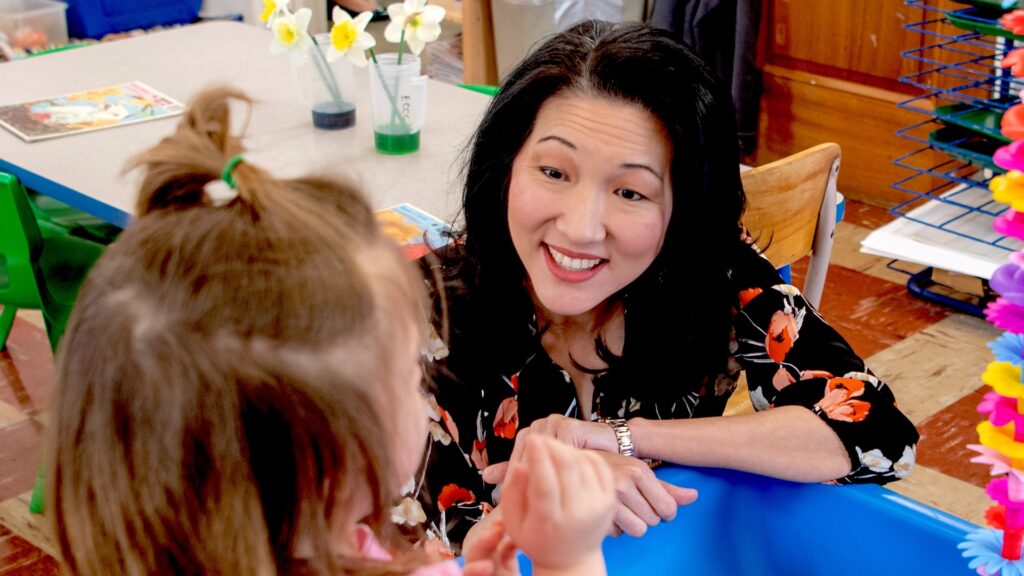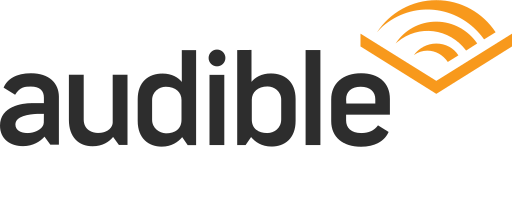Inspired Everyday: Michelle Kang, CEO of NAEYC

Michelle Kang – CEO of the Early Education organization “NAEYC” (National Association for the Education of Young Children) – has had a career arc that she describes as unexpected yet deeply rewarding. In their conversation, Jeana explores what Michelle is observing for the present and future in the field across the country. Michelle describes how she is constantly inspired by the passion early educators bring to their work and her commitments to the goals of improving support for teachers and administrators and working to further spread the message about the vital importance of high quality early learning. Michelle also relates as a mom herself she experienced firsthand how early education programs can make a profound and lasting difference.
Connect with Michelle
Jeana Ross
00:00:01 – 00:00:57
Who knows where your life might lead you? And if you’ve got your heart set on making a difference in early education, the road ahead may be full of twists and turns. Welcome to Starting At Zero . . . Starting At Zero . . . imagining a world of high quality education for our youngest citizens. I’m Jeana Ross. As an educator, policymaker, mother and grandmother, it’s my passion to advocate for the futures of our children. On today’s show, we talk to Michelle Kang, who is chief executive officer for the National Association for the Education of Young Children, also known as NAEYC. As CEO, Michelle is leading NAEYC towards their 100th year anniversary.
Jeana Ross
00:00:57 – 00:01:48
NAEYC’s annual conference is the largest early childhood education gathering in the world. NAEYC has set ten standards for early childhood programs which are also the foundation of NAEYC’s national accreditation system. NAEYC is advocating for increased federal investments and public support, and creating a professional community where every educator feels a deep sense of belonging. Michelle has devoted her career to equity in early childhood education. For 16 years, Michelle worked with Bright Horizons, the largest provider of employer-sponsored childcare in the United States. She then transitioned to NAEYC as their inaugural Chief Strategy and Innovation Officer. I very much enjoyed my conversation with Michelle and I’m glad to be sharing it with you.
Jeana Ross
00:01:48 – 00:01:54
Hello, Michelle. It’s wonderful to have you here to talk about your work.
Michelle Kang
00:01:54 – 00:02:38
Thank you. And first, I just have to say this is such a pleasure to have this conversation with you. And I appreciate the opportunity to share a little bit about NAEYC, and to talk a little bit about my journey. I never expected that I would have the honor and the privilege to sit in this seat . . . going from my Master’s in Education, to Bright Horizons, to the role of CEO . . . I just first want to start by saying that career journeys are not linear! And I’m sure that’s the story for you as well . . I know a little bit about your story. I didn’t expect that I would have the opportunity to be in this role, but so grateful that I’ve had the education and the experiences and frankly, mentors that have led me here.
Jeana Ross
00:02:39 – 00:02:43
So what keeps you inspired to be in the early childhood education field?
Michelle Kang
00:02:43 – 00:04:05
It’s hard not to be moved and compelled by seeing the work of early childhood educators. When you see the work that is happening in all these settings: it’s brain-building. They’re doing brain development every day, and the people who are doing the work are dedicated, passionate, committed professionals. And across our sector, there’s just such a commitment for creating that space for joy and play to ensure that young children are seen, held, supported, that their families are supported. I had the chance to visit an NAEYC-accredited program in Pennsylvania a few weeks ago when I was traveling there. What I saw there is what I see across the country when I have the chance to visit programs, and it reminds me every time that there are people who are showing up every day, knowing that this brain development – nothing is more critical. And it compels me, as well as all of those around me, and those of us who are doing this work, to champion support for them, champion that they need to be provided the appropriate compensation and support and recognition of the work that they do. And it’s frankly, actually very personal to me . . . because when I became a working parent . . . (my children are much older) . . .
Michelle Kang
00:04:05 – 00:04:59
I had the chance to experience the joys and benefits of quality childcare. I was a new mom, no family around me . . . just me and my husband. And it was overwhelming at times to have the enormity of the responsibility of caring for this infant young child. And what I didn’t know was that it would be the educators and the teachers in my child care center that would become part of my family, and become such an important part of my support system. It’s where I learned about “fine motor skills” and “sensory play” and all the different ways that we can help young children develop. And I felt like I had partners, and I felt like I had a community around me in the journey of caring for this young child. And I know that that is not what every family has who is seeking childcare. (But) I recognize that that is what we want.
Michelle Kang
00:04:59 – 00:05:32
And I feel such gratitude to the teachers that cared for my children, both my first son, and then my two sons who joined our family at a later time. And so I think about their stories, about what they were, they meant to me. And then when I see it happening in practice, it inspires me every day. And it keeps me centered in terms of the work that we do and keeps, frankly – all of us who are doing this work at NAEYC, this team that I work with – centered in being able to know that we are doing meaningful work.
Jeana Ross
00:05:32 – 00:05:55
It is so meaningful. And to communicate that over and over again . . . because that’s what it takes to make it understood . . . and that brain development early on, that we have to support our professionals. And NAEYC’s mission is to ensure that the early childhood profession exemplifies excellence and is recognized as performing a vital role in society . . .
Michelle Kang
00:05:55 – 00:06:58
Jeana, I think the pandemic laid bare what we have known all along . . . that early childhood educators, the work that they do, is essential for families across the country, and they need to have access to affordable, safe, high quality childcare options that meets their needs and their choices. I recall early on at the beginning part of the pandemic, when all of us went home, and even many child care programs closed for a short period of time, not all of them, which is one of the things that’s miraculous when you think about what was happening at the early part of the pandemic. But for a moment, everyone said: childcare educators, early childhood educators are essential! We can’t do this work . . . parents . . . I remember some of the early Zooms and people were struggling to do their work virtually and also care for children. And we are marveling – all of us – about how much we need the support of the work of childcare workers.
Michelle Kang
00:06:58 – 00:08:42
That is something that I think on when I think about some of the stories now, where some people who I meet, our members and our educators in our journey, talk about how they felt “seen” for a moment – and how can we bring that back, and how can we continue to elevate how necessary and essential they are? So we see our work at NAEYC as an integral part of ensuring that the broader society understands and recognizes this reality and translate that into support, and championing the messages of what the ECE profession needs, support for compensation, for benefits, for their work being valued. You know, to talk about the fact that 90% of the brain is developed by the age of five. And we need to say out loud some of the work that is being done with these youngest learners and how vulnerable this population is and how important it is that we are supporting the people who are doing the work of caregiving and educating. Right now there’s a pipeline issue for the profession because individuals feel there’s little to no incentive to become part of the profession. And we have a retention problem because the demands of the career and the low wages and benefits that come with the work, and this for us, has continued to create a consistent call to action for all of us, that we are doing everything we can to ensure we have the workforce that we need to meet the needs of young children, for children today and into the future. And this is the work NAEYC has been doing for nearly 100 years and will continue to do and feels even more so now, where we are the call to action that we all need to have.
Jeana Ross
00:08:42 – 00:08:55
NAEYC does an amazing job of bringing together stakeholders to give a voice to the early childhood community. What are some of the most effective ways you’ve seen this done in your organization?
Michelle Kang
00:08:55 – 00:10:19
One of the greatest joys we have with our 60,000 members. And then, of course, the community that’s even beyond our membership of all of those who are in this field, is using our platform to be able to elevate, amplify, and center the voices of those who are doing the work. So for me personally, I have been so fortunate to have talented educators and talented program directors, family childcare providers join me at press conferences, at rallies, at events. I had someone join me both times when I spoke on Capitol Hill in the past year when I’ve had national audiences, my very first professional learning institute last year, I brought a local educator from Ohio to join me on stage and to talk about her work and to bring voice to the work so that people see themselves in the work. We also work hard to partner with other organizations to make sure that we’re speaking united, so that we bring together our voices from our members, but that we are working side by side with like minded organizations who recognize how important this work is. And you know, we love working in partnership with people in states who also recognize this is something that you have done over your years, Jeana, is to ensure that we’re united when we’re talking about the importance of early childhood and investing in early childhood and investing in early childhood professionals.
Jeana Ross
00:10:26 – 00:10:36
I wanted to ask you, Michelle, a little bit about your journey from a master’s in education to Bright Horizons to the role of CEO at NAEYC.
Michelle Kang
00:10:36 – 00:12:10
I loved having the opportunity to graduate study in education policy and business and never expected that those two together would lead me to this moment where I have the opportunity to lead a global association that’s nearly 100 years old, if you can believe that! I learned when I was doing my education policy studies at University of Virginia. It was great to get into understanding those policy structures of education. But to be honest, I didn’t have a lot of exposure to early education at the time. That came much later after I had the opportunity with a chance meeting with the founder of Bright Horizons to understand their focus, which was to have high quality early learning, in particular in partnership with employers. And it made a lot of sense to me because in business school, I studied high performing organizations and I studied what it means to have people in roles supported and working effectively and what that means for organizational effectiveness. And Bright Horizons had gone into a space where they understood that working parents, parents who are employees, parents who are caregivers, have a challenge when they have young children of not being able to engage and contribute in the workforce meaningfully if you don’t have high quality childcare. So I became interested in the idea of how you can help employers understand that they potentially have a role, and it’s not the perfect solution.
Michelle Kang
00:12:10 – 00:13:53
There’s ways that we can talk about how we want to see that early education is invested in a meaningful and sustainable way, but employers have an opportunity to make a difference in this way. And that’s what I saw real time. So I spent the better part of a decade talking with employers about investing in high quality early learning as a way to provide caregiving supports. And is also how I got to understand NAEYC, because when I was working within employers and organizations, they wanted to understand, well, what does it mean to have high quality early learning? And Bright Horizons had made a commitment to have all programs accredited by NAEYC, which has these ten standards, and talks about what is developing appropriate practice, what is great environments. That’s where I understood that there was this organization who championed what quality early learning looks like, what developmentally appropriate practice looks like, and, you know, after spending time with employers and then becoming better connected to understanding the stories of those who do the work, by getting to know the educators and the leaders who do the work in this space, I wanted to broaden my lens beyond what happened at the centers that were at Bright Horizons. And that led me to NAEYC, where I had the opportunity to meet Rhian Evans Allvin, my predecessor, and realized that there was an organization out there who is speaking on behalf of educators in all settings, faith-based childcares, family childcare, small centers, large centers, head starts, public schools, championing high quality early learning for zero to age eight, and championing the needs of educators to be able to do this life changing work. So you could say I got hooked.
Jeana Ross
00:13:53 – 00:14:00
What a career and what an accomplishment . . . to have all your centers NAEYC-accredited . . . there were quite a few of them, weren’t there?
Michelle Kang
00:14:00 – 00:14:33
Yes. Yeah. So Bright Horizons has hundreds of child care centers, and they made that commitment because they understood the value of having quality learning environments for young children and for educators. And I felt that, to me, makes a lot of sense in terms of what are you trying to achieve in being able to provide quality care. So, yes, it was great to get introduced to NAEYC from that lens and then now to have the broader lens where I sit now and see all the work that we do.
Jeana Ross
00:14:33 – 00:14:50
Michelle, the pandemic played a huge role in pivoting the focus of NAEYC to ensure that the early childhood education field remained strong and intact. Describe to our listeners some of the pivots you made and how it affects the organization to this day.
Michelle Kang
00:14:50 – 00:16:51
So I was thinking about how the pandemic impacted us and who we were as an organization before it started. And I would say that it made evident our continued commitment to shine the light on and elevate the needs of those who are working day in and day out with children in early learning programs across the country. What we did and what we always do is to go back to our members to learn from them about what they need. What are the gaps? You know, how can we amplify that across diverse audiences in a wide range of spaces? And so, one thing we did very quickly at the beginning of the pandemic was to do surveys of the field, and those surveys are ones that we have done over the course of the last several years, where we have done a pulse check to ask people: What are you experiencing? How is this impacting your program? What does it look like for staffing? Are you having challenges? And then to also amplify, when funding did come out, to support them through the CARES act and through the ARPA funding, to ask about how that made a difference? Was that helpful? Was it helpful in being able to support you and being able to continue to serve families? And that steady drumbeat of bringing forward those voices we feel played a central role in securing the dollars that are sector received in the COVID relief funding. The unprecedented amount of $50 billion came because we were able to elevate the voices of those who said, if I’m not supported, I can’t be here to serve families. And if I can’t be here to serve families, there are people who cannot participate in the workforce, who cannot participate in school, and cannot participate as members of the community. And then businesses who also said, yes, that’s important. We need childcare to be here to help support us being able to continue our work. I will say as an organization, we adapted and adjusted our offerings and services to meet the needs of the workforce and the new realities of the pandemic.
Michelle Kang
00:16:52 – 00:17:44
So, like many organizations, we pivoted quickly to looking for virtual offerings. We moved our conferences online. We did changes in how we did site visits for our early learning program accreditation. We had to adapt because this is the world that we were in, and we knew that our members needed to be connected to us and to be supported by us. And I would also say as an employer, before the pandemic, we were 95% all based out of our DC office. So most of us were here in the DC office. We’re now a truly hybrid employer, and we have adjusted even how we work with now more than 30% of us who are across the country. And we’ve had to adapt in how we are working as an organization, but also how we are then meeting our needs.
Michelle Kang
00:17:44 – 00:18:27
So it’s, I would say, like for many of us, we’ve had to learn how to adapt and we continue to do that. I will say that all the lessons we have learned and some of the feedback we’ve heard, especially with our virtual events, is it has enabled us to meet people where they are. There are folks who had never been able to participate, being part of a NAEYC conference that could – because we were able to do a virtual offering. And we saw that with public policy forum where we might have had 400 people come inside on site and be part of the community together, where we were together. But we had another 700 plus who joined us online. And that was wonderful. And it shows another way how we’re going to continue to adapt and think about how we connect and create the community for NAEYC members.
Jeana Ross
00:18:27 – 00:18:33
Well, how do you feel the early childhood education field pivoted as a whole?
Michelle Kang
00:18:33 – 00:19:37
We’ve seen deeper engagement in advocacy, in policy, in sharing the messages of the meaning of early childhood education. No longer, frankly, a choice, but a necessity. It has served as a time where we have had to be flexible and nimble. And we’ve known this. Our field, the early childhood education field, is, I want to say, in some ways, the beacon of flexibility and nimbleness. And in many ways, when so much has been uncertain, we’ve actually seen so many wonderful examples, especially through our affiliates, where affiliates have created these intentional spaces where people have been able to come together and share and connect, learn from each other and lean on each other. And that for me, that sense of creating a community and creating a space of belonging is so important to me and so important to so many of us. And, you know, I will say that is something that I have seen, I think the field has done is to be very intentional about how we are connecting and uniting our voices.
Jeana Ross
00:19:38 – 00:19:49
Well, you are deeply committed to creating a sense of belonging and inclusive leadership into organizations. Could you explain why that’s so important to you and how it shaped your work in the field?
Michelle Kang
00:22:17 – 00:21:02
Belonging and inclusive leadership is deeply important to me, and it’s highly personal. I’m the daughter of Korean immigrants. My mother came to this country 50 years ago. My father, a few years ahead of that. And because of their experience coming to a place where the language wasn’t their own, with different cultural norms, different ways of learning how to be part of a community . . . As the oldest child, I’ve spent much of my lifetime translating both language and culture. And as I think about what those experiences were like as a family when I was growing up, but also for my parents, where there were times where they were not included, that it was not an inclusive environment. And there were times where I felt as a child growing up in a rural area of Virginia, that I was not seen or included. I take those experiences with me when I think about our responsibility as an organization to create a space of belonging for different voices, for different lived experiences. And I take it personally in my role as the leader of this organization, but also as a leader in this field where people can look around them and see themselves and see their story, wherever their story is.
Michelle Kang
00:22:26 – 00:22:17
And for my story, it’s about being the oldest daughter of Korean immigrants and growing up in a rural area of Virginia and having a path where I didn’t have a lot of people around me who I felt connected to. But then remembering when I had had those moments where people did see me, where I had mentors who understood and believed in me and saw leadership in me. I have a personal responsibility in this space to now do that on behalf of others. But I want to model and show that for others in early education. I want to continue to create those spaces. I’m doing it in partnership with my team members and my leaders. I feel so proud and honored that I work alongside amazing leaders, not only on my team who work with me, but across my organization and across the affiliate leadership network, and also all those who volunteer in capacities – from our governing board to boards of different affiliates. And I know that all of us feel a sense of wanting to make sure that anyone who cares about outcomes for young children – and anyone who cares about those who are doing the work on their behalf – can see themselves with a place here at this organization and to work alongside us and to be part of this work and to be part of our movement.
Jeana Ross
00:22:42 – 00:22:26
Michelle, I think we both agree that books are vital to the education of young children. And I always like to ask my guests . . . what’s your favorite children’s book and why?
Michelle Kang
00:23:12 – 00:22:41
I’m going to say it was one of the books that I enjoyed reading to my children growing up because they enjoyed it so much, which is “The Giving Tree” – because, of course, we had to read it a bajillion times.
Jeana Ross
00:24:06 – 00:23:12
And children are so interesting in that they will get a favorite book and they’ll want to hear it every night, two or three times . . . the young children. We went through that with several different books over the years. So it would be very hard for me to say what my favorite book is and why . . . because what might have been my favorite book . . . after reading it 300 times . . . night after night, for a couple of times a night . . . it might not be my favorite anymore!
Michelle Kang
00:24:05 – 00:24:05
Right!
Jeana Ross
00:24:38 – 00:24:05
Because I keep thinking about the “little red caboose” that always came last. And I could quote that book verbatim, even though it was read over 40 years ago to my children. They just couldn’t get enough of it, you know? And I wish we could help parents, all parents, understand how important reading to their children is . . . not only for language development, but that connectedness with their family . . . and the attachment that it can create, just that special time of reading a book. So I hadn’t thought about that in a long time. My oldest son is 43, and I started thinking about “the little red caboose always came last. First came the big black engine puffing and chuffing!” It’s been that long and I can still recite it . . .
Michelle Kang
00:25:18 – 00:24:38
As your children age out of things, you give away things. (But) one of the things I couldn’t give away were the children’s books. And so in my house, there are two huge bookcases that I can’t give up . . . I can’t give them up. And because they just mean different things to me over the years in terms of how they grew up. And like you said, you read them over and over and over again. I would say a more recent book is actually one that’s behind me. This is by Yuyi Morales . . .
Michelle Kang
00:25:31 – 00:25:18
It’s called “Dreamers.” And it’s a beautiful story about family, and I identify very much in terms of being able to think about their world, of coming to America and dreaming of a future. And I feel at times very much that I’m living out the immigrant family dream. And it’s been very meaningful to me. Last month, I was invited to the White House to celebrate Women’s History Month. And I was very emotional there, realizing that my parents had no idea that one day, their daughter would get invited to the White House to celebrate the achievements of women!
Jeana Ross
00:26:02 – 00:25:30
Michelle, thank you so much for joining me, and I’m glad to have had you here and to share your story. Can you give our listeners a way that they might find you or connect with you?
Michelle Kang
00:26:10 – 00:26:02
Yes . . . we invite folks to visit our website, which is www.naeyc.org, and also to follow us on social media. We love sharing our stories of impact, but also sharing resources, and I invite our listeners to connect with me and with NAEYC through our different social media accounts, and look forward to having the collective voices of those who are listening to join our movement and to be part of the work that we’re doing to elevate early childhood education.
Jeana Ross
00:27:12 – 00:26:10
Well, I was going to ask you: do you have any calls to action that you would like to share with our community . . . and that sounded like a pretty good one!
Michelle Kang
00:27:10 – 00:27:12
Okay! Ha.
Jeana Ross
00:27:24 – 00:27:10
Starting at Zero . . . imagining a world of high quality care, education, and success for our youngest citizens. Please visit us at: starting at zero podcast dot com. You can check out more episodes and also subscribe. On the website you’ll find links mentioned in the episode, along with transcripts, show notes, as well as exclusive materials shared by today’s guest. You’ll also find the video version of today’s episode. That’s startingeropodcast.com. If you found our insights on early childhood education valuable, we’d be thrilled if you could take a moment to leave a review. Your feedback not only supports our podcast, but also helps us spread the word about the importance of early education. Connect with me on Twitter and Instagram at: startingatzero and saulzaentzcharitable.
Jeana Ross
00:27:14 – 00:27:24
I cannot wait to share our next conversation with you and imagine a future where every child finds early success.
Learn More About Our Work
Feedback & Contact
Copyright © 2024. Starting at Zero Podcast and the Saul Zaentz Charitable Foundation™. All Rights Reserved. Site Design: Chair 8 Design.





